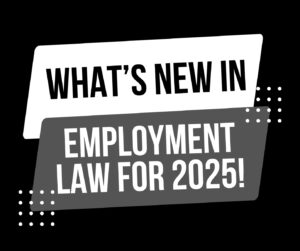Within the past few weeks, three fairly important cases were decided by our state and federal appellate courts which will be significant for anyone practicing in the labor and employment arena. Here is a brief summary of those cases, and what they mean for practitioners out there.
Adan Ortiz v. Randstad Inhouse Services, LLC
(9th Circuit; March 12, 2024)
This is another important decision clarifying the transportation worker exemption in the Federal Arbitration Act (“FAA”). The court held that even where a warehouse worker does not actually transport any goods across state lines, and merely moves certain goods across the warehouse floor to prepare them for being shipped out, that worker played a “direct and necessary role in the free flow of goods across borders.” As such, that worker fell within the FAA’s exemption for transportation workers, and thus the employer’s motion to compel the worker’s class action lawsuit to arbitration was denied.
Upshot: Employers, including their staffing companies, will have a tougher time compelling arbitration of class action suits if the employees are at all involved in the movement of goods from the manufacturer to the ultimate end user of the product.
Gramajo v. Joe’s Pizza on Sunset, Inc.
(2nd District; March 25, 2024)
This case is important because it will make the attorneys’ fee component of wage and hour litigation an even larger factor than it already is when it comes to settling these types of cases. Here, the plaintiff recovered only about $7,700 in unpaid wages following a trial, yet sought approximately $325,000 in prevailing party attorneys’ fees and costs pursuant to Labor Code §1194(a). The trial court denied the fee request in its entirety, finding that the case was over litigated and that the fees were grossly disproportional to the limited success at trial.
But the Court of Appeal reversed, finding that under Labor Code §1194(a), all that is required is that the plaintiff prevail- irrespective of the amount of the recovery. Although a fee motion under CCP §1033 allows the trial court discretion to deny a fee request, Labor Code §1194(a) does not permit any such discretion. The court did emphasize, however, that the fee award must be “reasonable”, although the trial court cannot refuse to award them outright. So, in the wage and hour world, Plaintiff’s will use this as a way to settle more cases for more money, as it is clear that even an extremely small recovery of unpaid wages cannot prevent an award of attorneys’ fees.
Huerta v. CSI Electrical Contractors, Inc.
(Cal. Sup. Ct., March 25, 2024)
Our High Court further clarified the circumstances when an employee must be compensated prior to the actual start of his or her shift. Here, the employee had to drive through a security gate on the outskirts of the employer’s facility, where he went through a security check that was mandated by the employer. From there, it was another 10-to-15-minute drive to reach the employee parking lot. The employee had to go through this security check coming to work and then again leaving at the end of the day. The employee filed a class action for unpaid wages for the time spent in his vehicle passing through the security check.
The Supreme Court found such time to be compensable and held that when an employee’s presence at a location is required by the employer within the meaning of Wage Order 16, then the employee must be compensated for that time. The important takeaway here is that any time an employee is subject to some aspect of employer control either before the shift begins or following the conclusion of the shift, there is a good chance that that employee will be entitled to compensation. Employers need to carefully scrutinize whether they have any such requirements of their workforce, and if so, they need to be prepared to compensate their employees under these circumstances.











